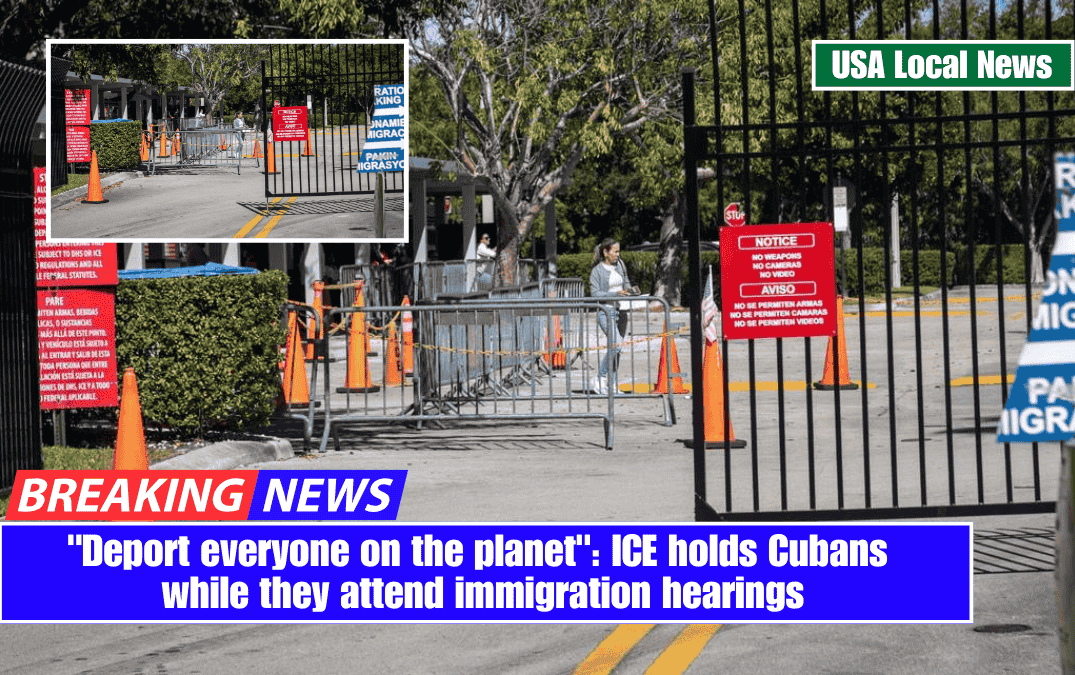According to local attorneys, federal authorities in South Florida recently detained at least 18 Cubans during scheduled immigration appointments, demonstrating that a group that has historically received special immigration benefits is not immune to the Trump administration’s increased mass deportation efforts.
In recent years, hundreds of thousands of Cubans who crossed the U.S.-Mexico border have received I-220A forms, which are Immigration and Customs Enforcement documents that record someone’s release from custody under specific conditions.
That paperwork does not confer legal status. Federal judges have ruled that it cannot be used to apply for green cards under the 1966 Cuban Adjustment Act, which allows Cuban nationals to obtain permanent residency a year and a day after touching US soil. Cubans with I-220As must seek asylum or apply for a family-based green card to stay in the US.
ICE has detained Cubans with I-220As, primarily women, at regular check-ins in the agency’s Miramar field office, according to attorneys. Their detentions are yet another example of how newly arrived Cubans’ experiences differ from previous generations, who frequently received preferential treatment in the federal immigration system.
Under the Biden administration, ICE was primarily concerned with detaining public safety and national security threats. Cubans with I-220As were not detained unless they had a criminal record.
That appears to have changed during the Trump administration.
“They were consistently vulnerable. “It’s just that someone decided to take action,” said Miami immigration attorney Mark Prada. “It’s all about discretion and priority decisions. Right now, the priority is to deport everyone under the sun.”
The Department of Homeland Security did not respond to Herald inquiries about whether Cubans with I-220As are now considered a detention and deportation priority by ICE. Trump has stated that he wants to deport the millions of undocumented immigrants living in the United States.
“It is the policy of the United States to faithfully execute the immigration laws against all inadmissible and removable aliens,” Trump stated in an executive order issued on his first day in office.
Beatriz Monteagudo, 25, is one of the recently detained Cubans, according to her friend Johan Ariel. They texted each other every day. But the last message he received from Monteagudo was on March 10.
The Cuban woman, who received an I-220A after entering the United States in January 2024, was on her way to a check-in appointment in Miramar.
Ariel quickly became concerned that he hadn’t heard from her after the appointment. When he searched the ICE detainee locator service online, her name came up. Then Monteagudo called.
When she called Ariel from the detention facility, she said she was with about 18 other people who had been detained after arriving for routine appointments. Monteagudo told him she hadn’t been told why they were there, other than the officers mentioning that the laws had changed.
According to Monteagudo, neither he nor Ariel have received any responses. Monteagudo was transferred to a detention facility in San Diego this week after living in Miami.
“I am completely left in the dark right now,” Ariel told the Herald. “I am so worried and have no resources to help her.”
Ariel, who arrived from Cuba two years ago, is concerned for Monteagudo’s safety if she is returned to her home country. She had issues with the island’s authorities after taking part in the widespread anti-government protests on July 11, 2021.
“If she returns to Cuba, she will be imprisoned right away,” Ariel told me. “That’d be destroying her life.”
Rebeca Sanchez-Roig, an immigration attorney at Catholic Charities Legal Services of Miami, described ICE’s decision to detain Cuban women with no criminal records as “unusual.”
“But while unusual, it’s not legally impossible,” she told me.
Cuba does not always accept American deportation flights; as many as 42,000 Cuban nationals remain in the United States despite deportation orders. That means that the federal government is having difficulty deporting people to Cuba.
Several Latin American countries have agreed to accept US deportees from other countries, and experts warn that Cubans may also be sent to Guatemala, Honduras, Costa Rica, or Panama. Mexico already returns Cubans who arrive at the southwest border under a deal it negotiated with the Biden administration.
Hundreds of Venezuelans were recently transferred to an El Salvador mega-prison as part of a deal reached between the Trump administration and Salvadorean President Nayib Bukele last month.
Wilfredo Allen, an immigration attorney based in Miami, represents an asylum seeker who was recently detained in Cuba. The majority of the cases he has learned about involve women. He stated that this is the first time he has seen Cubans with I-220As, pending immigration cases or green card applications, and no criminal records end up in ICE custody.
“It’s causing a major panic,” Allen said.
Laura de la Caridad Sanchez, 27, is one of the Cuban women with I-220A visas detained by ICE while attending an immigration appointment in Miramar, according to her attorney, Eduardo Soto.
Soto said he has no idea why Sanchez, who was living in Coral Gables with her mother, and the others were detained; he added that immigration officials cited a memo that “came down from the powers that be in Washington.”
Soto has stated that he is prepared to file a federal lawsuit if she is not released.
“This step was taken to detain her and place everyone in a panic,” Soto recalled. “It’s a waste of the government’s time and money and her time and money.”
U.S. Rep. Maria Elvira Salazar of Miami, who has positioned herself as a champion for Cubans with I-220As, confirmed to X that she was aware of the recent detentions at ICE’s Miramar office.
“I recently spoke with ICE and Homeland Security officials and asked them not to detain Cubans with I-220A and allow their asylum cases to be heard,” Salazar said in a statement posted in Spanish. “As you all know well, during the Biden administration I sought a solution for Cubans with I-220A, and I will not stop until it’s no longer necessary.”
Miami U.S. Reps. Carlos Gimenez and Mario Diaz-Balart, both Cuban Americans, did not respond to Herald requests for comment.
They have not made any statements about the detainees. Diaz-Balart, on the other hand, expressed outrage with the Biden administration in 2023 over its I-220A policies affecting Cubans, stating that they “cause confusion, chaos, and injustice.”
‘Face-eating leopards’
Prada described the large number of Cubans who have received I-220A documents as “a backdoor repeal of the Cuban Adjustment Act.” He has been at the forefront of several lawsuits that have resulted in Cubans with I-220As being granted parole to remain in the United States and eventually obtain permanent residency.
Lawyers say that for South Florida’s Cuban community, many of whom supported Trump’s presidential campaign, the rapid changes in immigration enforcement may be surprising.
“People come out in favor of the face-eating leopards,” Prada informed the audience. “And then they get surprised when the leopard eats their face.”
The detention of Cubans by ICE in Miramar is instilling fear in South Florida’s immigrant community, according to Allen, a Miami immigration attorney for over 30 years. He believes the Trump administration is attempting to “intimidate” people and create panic so they will voluntarily return to their home countries.
According to Allen, the panic is affecting more than just immigrants. Immigration officers are under pressure for not detaining enough people, and judges and government lawyers are being coerced into rejecting people’s requests to stay in the United States.
Allen stated that, despite their fears, people with I-220A should continue to attend appointments and court dates.
“They should hold faith that this year a federal court will rule in favor of them.”















